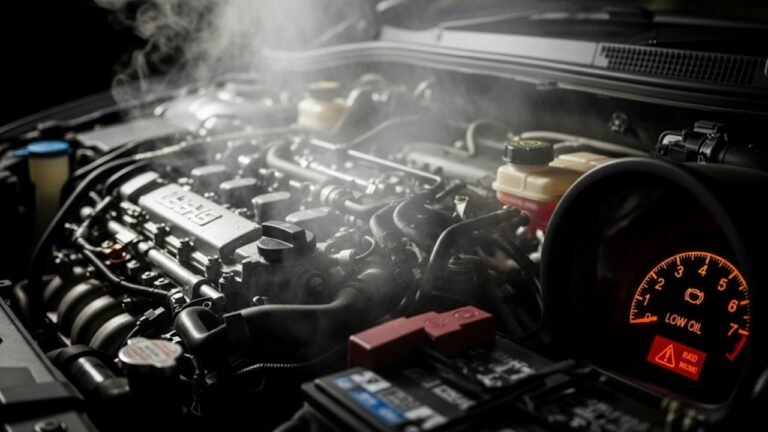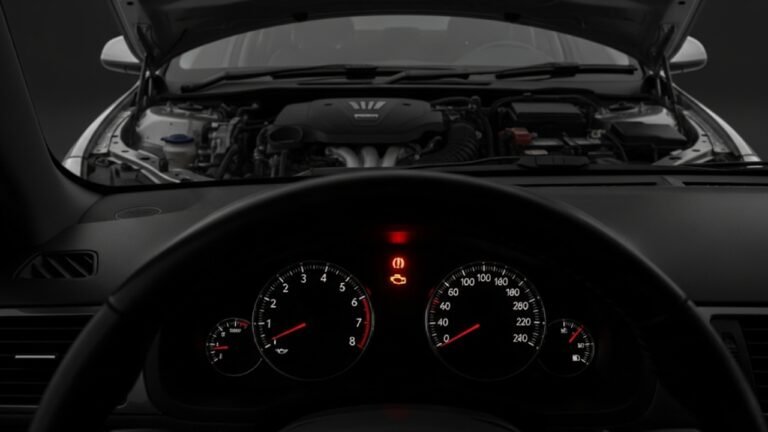Can Oil Stop a Car from Starting?

Have you ever jumped into your car, turned the key, and—nothing? No crank, no rumble, just dead silence. That sinking feeling in your chest, the rising panic—especially if you’re late to work or stuck in the middle of nowhere—is something most of us know too well. Naturally, the first thought might be a dead battery or faulty starter. But here’s a curveball: can oil stop a car from starting?
It’s a question that sounds odd at first. Oil? That slick liquid we mostly think about during routine oil changes or messy driveway spills? Surprisingly, yes—your engine oil can absolutely play a role in preventing your car from starting. And in this guide, we’re going to unpack every reason why that might happen.
Let’s treat this like a chat between two friends over coffee. You’re worried, curious, maybe frustrated. I’ve been there, trust me. I’ve seen a car refuse to start right after an oil change—and another freeze up on a frosty morning because the oil was too thick to flow. So let’s dig in, figure out the real story, and learn how to keep our cars happy and healthy.
In This Article
- 1 Understanding the Role of Oil in Your Engine
- 2 Low Oil Levels: The Silent Engine Killer
- 3 Too Much Oil: When More Isn’t Better
- 4 Oil Viscosity: The Wintertime Enemy
- 5 Oil-Related Sensor Issues and False Alarms
- 6 How to Diagnose an Oil-Related No-Start Problem
- 7 How to Prevent Oil from Becoming a Starting Problem
- 8 Common Myths About Oil and Car Starting Issues
- 9 The Emotional Toll of a No-Start Situation
- 10 Frequently Asked Questions (FAQs)
- 10.1 1. Can dirty oil prevent a car from starting?
- 10.2 2. Will synthetic oil help in winter starts?
- 10.3 3. How do I know if I’ve overfilled my oil?
- 10.4 4. My car won’t start after an oil change—why?
- 10.5 5. Can a bad oil pressure sensor prevent starting?
- 10.6 6. Can running on low oil once cause permanent damage?
- 10.7 7. Should I warm my car up before driving in winter?
- 11 Final Thoughts: Don’t Let Oil Be Your Car’s Weak Link
Understanding the Role of Oil in Your Engine

Engine oil acts like a cushion. It reduces friction between metal parts, carries away heat, and even helps clean out tiny bits of debris. Modern oils also contain additives that protect against corrosion and buildup.
Now, here’s where things get interesting: if the oil isn’t doing its job—or if there’s too much or too little of it—it can mess with how your engine behaves. That includes preventing it from starting entirely.
Quick Oil Facts:
| Function | Why It Matters |
|---|---|
| Lubrication | Prevents engine parts from grinding |
| Cooling | Carries away heat from combustion areas |
| Cleaning | Removes debris and sludge |
| Sealing | Helps create tight seals in engine cylinders |
| Corrosion Prevention | Protects metal surfaces from rusting |
When oil fails to do any of these jobs—especially the first two—it can impact how well your car starts. So yes, in some situations, oil can stop a car from starting.
Low Oil Levels: The Silent Engine Killer
Let me share a quick story. A buddy of mine, Jake, was driving an old Toyota Camry. He hadn’t checked the oil in months—out of sight, out of mind, right? One cold morning, he turned the key. Nothing. Not even a click. After hours of troubleshooting, the mechanic asked a simple question: “When’s the last time you checked the oil?”
The dipstick came up dry. Bone dry.
When oil levels drop too low, the engine can seize. It’s like trying to run a race with no cartilage in your knees—everything locks up. And if the damage is already done, the car might not start at all.
Why Low Oil Prevents Starting:
-
No lubrication = seized parts
-
Overheating damage from past driving
-
Engine control unit (ECU) might block ignition to protect the car
Some newer cars are smart enough to detect dangerously low oil levels and refuse to start to avoid further damage. Think of it as your car’s way of saying, “I won’t hurt myself just because you forgot to check.”
Too Much Oil: When More Isn’t Better
Now, on the flip side, let’s talk about overfilling. You might think, “Well, if oil is good, more must be better, right?” Not quite.
Overfilling your engine oil can create its own set of problems. The crankshaft, which spins rapidly inside the engine, can whip excess oil into foam. That foam doesn’t lubricate—it just churns around uselessly. And in some engines, too much oil causes pressure buildup that leads to blown seals or even sensor malfunctions.
Here’s where it gets crazy: some cars will detect oil overpressure or faulty readings from oil sensors—and will refuse to start as a safety measure.
Signs of Too Much Oil:
-
White smoke from the exhaust
-
Rough idle or stalling
-
Strong smell of burning oil
-
Engine warning lights
So yes, again, oil can stop a car from starting—even when there’s too much of it.
Oil Viscosity: The Wintertime Enemy
Here’s a metaphor for you: have you ever tried pouring honey out of the fridge? That’s what thick oil looks like on a freezing morning.
Viscosity is a fancy word for how thick or thin oil is. And if you’re using oil that’s too thick for the temperature, it won’t flow properly when you try to start your engine.
Imagine trying to breathe through a straw filled with peanut butter. That’s your oil pump on a cold morning with the wrong oil type.
Most oils today are “multi-grade,” like 5W-30. The “5W” means it flows well in winter. But if you use something like 20W-50 in a cold climate, your engine might struggle—or flat-out refuse—to start.
Cold Start Tips:
-
Use manufacturer-recommended oil grade
-
Switch to synthetic oil in winter (flows better cold)
-
Warm up your engine gently—don’t rev hard
So once again, yes—can oil stop a car from starting? Absolutely, especially if it’s the wrong kind for your weather.
Oil-Related Sensor Issues and False Alarms
Modern cars are smart. But like all tech, they’re also a bit paranoid.
Your vehicle uses a network of sensors to monitor everything, including oil pressure, oil temperature, and oil quality. If any of these sensors detect something wrong—like low pressure or a faulty reading—they might send a signal to the ECU to block the start process.
Think of it like a false fire alarm. There’s no real danger, but the system shuts everything down just in case.
Common Sensor Issues:
-
Faulty oil pressure sensor
-
Damaged oil temperature sensor
-
Corroded wiring or connections
-
Inaccurate readings from old or dirty oil
One client of mine had a perfectly fine engine but couldn’t start her car. We scanned the system and found the culprit: a faulty oil pressure sensor. A quick replacement and the car roared to life.
So sometimes it’s not even the oil itself—but the car thinking there’s an oil problem—that causes a no-start issue.
How to Diagnose an Oil-Related No-Start Problem
When your car won’t start, your first instinct might be to blame the battery—or even panic. But if you’ve ruled that out, it’s time to look under the hood and see if oil can stop a car from starting in your case.
Start with these steps, like a detective working a mystery:
Step-by-Step Checklist:
-
Check the Dipstick
Pull it out, wipe it clean, reinsert, and check the oil level. If it’s low or bone dry, that’s your first red flag. -
Smell the Oil
Oil should not smell burnt. If it smells like it’s been cooked, that’s a sign of overheating or sludge buildup. -
Check Oil Color
Clean oil is amber or light brown. Black, gritty, or milky oil signals trouble—maybe even water in the system. -
Look for Warning Lights
Your dashboard might light up with oil pressure or check engine warnings. Don’t ignore them. -
Listen Carefully
Is the engine turning over? Or is there just silence? A seized engine from oil issues won’t crank at all. -
Use an OBD2 Scanner
This tool can tell you if a faulty oil sensor is blocking the ignition.
If you’re seeing multiple signs pointing toward oil issues, it’s safe to say that yes, oil can stop a car from starting, and it’s time for a fix.
How to Prevent Oil from Becoming a Starting Problem
Think of this like preventative medicine for your engine. A few simple habits can save you a lot of stress down the road.
Oil Health Maintenance Tips:
-
Check oil every 2 weeks, especially in older cars
-
Change oil every 3,000–5,000 miles or as your manual suggests
-
Use synthetic oil in extreme temperatures
-
Avoid cheap oil that breaks down faster
-
Keep your sensors clean and test them occasionally
Also, always check your oil after an oil change. Mechanics make mistakes. One of my clients had their car overfilled at a quick-lube place, and it wouldn’t start the next morning. We had to drain nearly a quart to get things running again.
Maintaining your oil isn’t just good for performance—it could be the very thing that keeps your car starting every morning.
Common Myths About Oil and Car Starting Issues
There’s a lot of bad info floating around out there. Let’s bust a few myths that might be confusing you.
Myth 1: “If my oil light isn’t on, the oil’s fine.”
False. By the time your oil light comes on, you might already have damage. That light measures pressure, not volume. Low oil might not even trigger it.
Myth 2: “More oil is better.”
Wrong again. Overfilling can cause major issues, from poor fuel economy to full-blown engine failure. Keep it between the dipstick lines.
Myth 3: “Thicker oil protects better.”
Only sometimes. In cold climates, thick oil can be a problem. Stick to what your owner’s manual recommends.
Myth 4: “Oil can’t stop a car from starting.”
Now you know better than that!
So don’t get caught believing myths. Can oil stop a car from starting? Yes. And ignoring the signs could cost you a fortune.
The Emotional Toll of a No-Start Situation
Let’s step away from the mechanics for a moment. When your car won’t start—especially when you don’t know why—it feels personal. You feel stranded, helpless, even embarrassed.
I remember standing in a parking lot in the middle of a snowstorm, late for a meeting, turning the key again and again. I thought it was the battery, then the starter. Turns out, my oil had thickened like molasses overnight. I felt defeated. But now I check my oil every Sunday like clockwork.
That peace of mind? Priceless.
You’re not alone in this. Cars are complicated. But now that you know how oil can stop a car from starting, you’ve got a powerful tool: understanding.
Frequently Asked Questions (FAQs)
1. Can dirty oil prevent a car from starting?
Yes. Dirty oil can clog vital components, mess with sensors, and prevent proper lubrication—leading to no-start conditions.
2. Will synthetic oil help in winter starts?
Absolutely. Synthetic oil flows better at low temperatures and is less likely to cause cold start issues.
3. How do I know if I’ve overfilled my oil?
Check the dipstick. If the oil level is above the “MAX” line or you smell burning oil, it’s likely overfilled.
4. My car won’t start after an oil change—why?
Check for overfilling, loose oil filter, unplugged sensors, or even forgetting to add oil after draining the old one. It happens more than you’d think.
5. Can a bad oil pressure sensor prevent starting?
Yes. Many modern cars will block ignition if they receive incorrect oil pressure data to protect the engine.
6. Can running on low oil once cause permanent damage?
Unfortunately, yes. Even a short run on dangerously low oil can cause enough heat and friction to damage components, potentially leading to future start failures.
7. Should I warm my car up before driving in winter?
It’s a good idea to idle for 30–60 seconds in cold climates. This gives the oil time to circulate and reduces engine wear.
Final Thoughts: Don’t Let Oil Be Your Car’s Weak Link
Let’s bring it home: Can oil stop a car from starting? Yes—without question. But here’s the good news: it doesn’t have to.
Your car talks to you—through warning lights, strange smells, even how it sounds. Listening to those signs and staying on top of oil maintenance can make all the difference. A little effort now can prevent huge stress later.
So be proactive. Check that dipstick. Pay attention to how your car feels in the morning. And never underestimate what a $30 bottle of oil can mean for a $5,000 engine.
Your car deserves love. And now, you’ve got the tools to give it just that.






